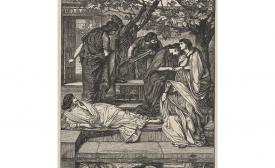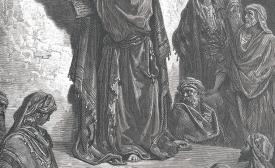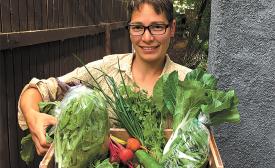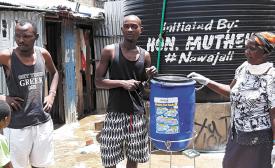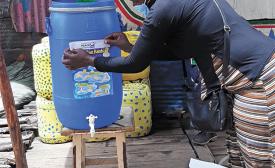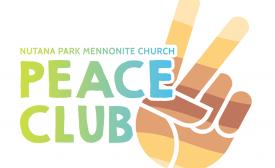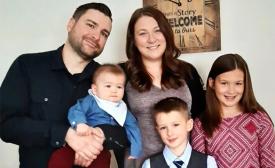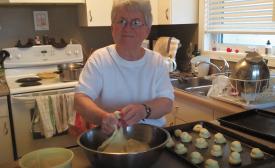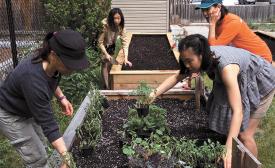Volume 24, Number 22
Before you share
“What is truth?” Pontius Pilate asked Jesus two thousand years ago. Today, as we read the newspaper, watch YouTube and TV news, listen to the radio, and scroll through social media, we confront that same question. In this time of pandemic, social upheaval and political strife, the distinction between truth and falsehood seems especially nebulous.
Faith forged in disorientation
This is an unprecedented time. Unprecedented—it’s a word we’re hearing a lot in the last few months. The sense of disorientation has been palpable, from eerily empty streets to new protocols at the grocery store, an ever-increasing number of masks and people performing acrobatic feats to maintain a two-metre buffer.
Readers write: October 26, 2020 issue
Voluntary service important in cross-border interaction
Re: “Cross-border interaction in decline since integration” letter, Sept. 14, page 9.
Reaping what you sow
As I finish off another growing season on the farm, I reflect on how things grew, what went well, and what to tweak for next year. Aside from our various pastured livestock, I also grow a market garden and, after nine years, I still feel that I have so much to learn.
Brubacher House
Within this Mennonite hearth, we can read an environmental history. By 1850, when John E. and Magdalena Brubacher built this house, the forest stands of southwestern Ontario were well on their way to being transformed into farmland. The harvesting and sale of wood and its products was the engine of the economy.
The neighbourhood community
Since living in a pandemic that has suddenly limited indoor socializing, I have been particularly thankful for the neighbourhood friendships we’ve created. In March and April, when we were all isolating, we actually got to know our neighbours far better.
‘You must be a Mennonite!’
As a young adult I entered a Mennonite college knowing little about Mennonites. I grew up (mostly) Baptist. I was astonished to hear people say over and over again, “You must be a Mennonite!” I sputtered that just because my last name is Klassen does not make me Mennonite, and that, in fact, I was a Christian who happened to be a member of a Baptist congregation.
Finding the ‘growth edge’ in our lives
My focus on growth may seem strange during this difficult season we’re in, but I believe that the best way to get through this pandemic is by growing.
My understanding of growth is simple. It’s the process of becoming who someone (or something) was created and designed to be.
There are many ways for us to grow during even the most-challenging times. We can grow by:
Anabaptist health network responds to COVID-19
“We are bound together as a community not only through this global pandemic, but through our faith,” says Rick Stiffney, steering committee member of the Global Anabaptist Health Network.
The global network held its first webinar on Sept. 16, which was attended by two dozen Anabaptist-related health professionals from Asia, Africa, North America and the Caribbean.
‘Peace is for everyone’
These days, with many congregations searching for ways to carry on with existing children’s programming, Nutana Park Mennonite Church in Saskatoon has launched a brand new peace club for children aged seven to 11.
Webinar addresses Doctrine of Discovery
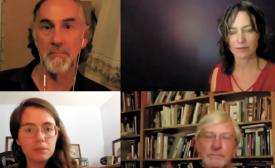
Participants in a Sept. 29 webinar on the Doctrine of DIscovery are, clockwise from top left: Ted Swartz, owner and director of Ted and Co. TheaterWorks; Michelle Milne, actor with Ted and Co.; Henry Krause of the MC B.C. Indigenous Working Group; and Alison Casella Brookins, playwright of We Own This Now. (Screenshot by Ross W. Muir)
A Sept. 29 webinar helped 260 participants learn more about the Doctrine of Discovery and how a proclamation made more than 500 years ago still has repercussions for Indigenous peoples today.
‘Be bold! Make yourselves known!’
Giugovaz is not a Mennonite name, but Steven Giugovaz is definitely an Anabaptist. Son of immigrants from Italy and with a Croatian heritage, he has been on a journey that has led him to embracing a Jesus-centred theology whose world isn’t flat, a commitment to peace and an admiration for the early “re-baptizers.”
Women supporting women across borders
Pamela Obonde came to Winnipeg from Nairobi, Kenya, in September 2019 to study in the master of arts in peacebuilding and collaborative development program at Canadian Mennonite University (CMU). But when the COVID-19 pandemic hit Manitoba in March, it threatened to foil all her plans.
Minority Mennonites organize a support group
When Gabby Martin mentions that she’s a Mennonite, she’s often met with, “Okay, but where are you from?” Her father is Black and her mother is Syrian; she was adopted by Mennonites. Martin grew up in Langham, Sask., and has been Mennonite her whole life, yet, because of her appearance, it feels like she’s expected to prove it.
Zwiebach from Saint Johanna
My earliest memories of food go back to my childhood in the Chaco, Paraguay, where my family lived from 1947 to 1952. Our family, like the others in our village, were refugees from Ukraine. We had arrived from Germany on the the S.S. Volendam, a Dutch freighter, with nothing but the clothes on our backs.
‘There is always a way’
Christen Kong, 27, was part of the community outreach team at Toronto Chinese Mennonite Church when the group started a local butterfly garden to encourage pollinators. Kong marvels at how that small garden project became a “community connector” and a place of healing and wholeness.
Zwiebach recipe
Now that I am retired, I love to bake zwiebach and have become known at Jubilee Mennonite Church in Winnipeg as the “Zwiebach Lady.”





